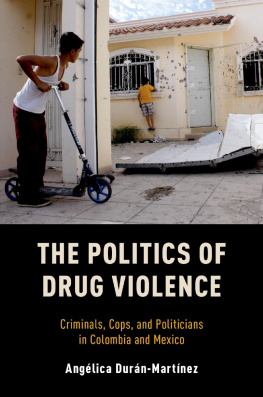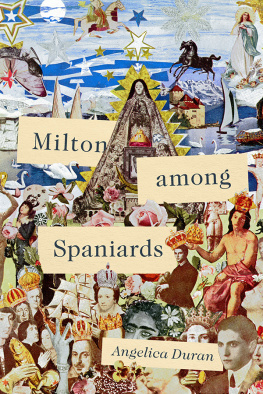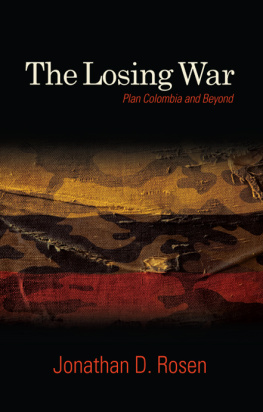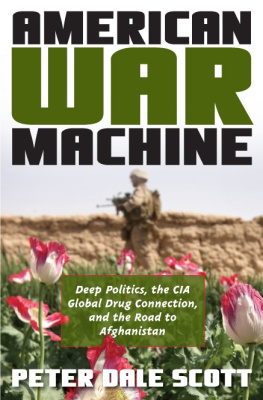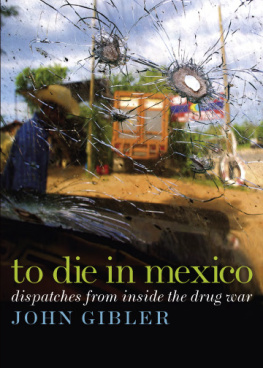The Politics of Drug Violence
The Politics of Drug Violence
Criminals, Cops, and Politicians
in Colombia and Mexico
ANGLICA DURN-MARTNEZ
Oxford University Press is a department of the University of Oxford. It furthers the Universitys objective of excellence in research, scholarship, and education by publishing worldwide. Oxford is a registered trade mark of Oxford University Press in the UK and certain other countries.
Published in the United States of America by Oxford University Press
198 Madison Avenue, New York, NY 10016, United States of America.
Oxford University Press 2018
All rights reserved. No part of this publication may be reproduced, stored in a retrieval system, or transmitted, in any form or by any means, without the prior permission in writing of Oxford University Press, or as expressly permitted by law, by license, or under terms agreed with the appropriate reproduction rights organization. Inquiries concerning reproduction outside the scope of the above should be sent to the Rights Department, Oxford University Press, at the address above.
You must not circulate this work in any other form and you must impose this same condition on any acquirer.
Library of Congress Cataloging-in-Publication Data
Names: Durn-Martnez, Anglica, 1979 author.
Title: The politics of drug violence : criminals, cops and politicians inColombia and Mexico / by Anglica Durn-Martnez.
Description: New York : Oxford University Press, [2018] | Includes bibliographical references and index.
Identifiers: LCCN 2017029902 | ISBN 9780190695958 (hbk : alk. paper) | ISBN 9780190695965 (pbk : alk. paper) | ISBN 9780190695972 (updf) | ISBN 9780190695989 (epub)
Subjects: LCSH: Drug trafficColombia. | Drug trafficMexico. | Violent crimesColombia. | Violent crimesMexico. | Colombia Politics and government. | MexicoPolitics and government.
Classification: LCC HV8079.N3 D87 2018 | DDC 364.1/336509861dc23LC record available at https://lccn.loc.gov/2017029902
CONTENTS
Figures
Tables
Maps
In 1988, when I was nine years old, I was walking with my mom two blocks away from our home in Bogot, and a bomb went off at a nearby auto repair shop. It was the time when Pablo Escobar and the Medelln drug cartel had declared a war against the extradition of Colombian nationals to the United States that unleashed a period of violence in Colombian history often referred to as narcoterrorism. Only a few seconds saved us from being victims of that bomb. As people rushed to the scene, my mom ran away in the opposite directionconfused, scared, and thankful that we had escaped. That was my closest experience to violence. While growing up in Bogot, I was relatively protected from the armed conflict that besieged many rural areas, but during the period of narcoterrorism, violence also overwhelmed Colombias major cities in attacks like the one I escaped. Over the years, I have come to believe that such experience sparked my interest in studying violence, drug trafficking, and crime. However, such interest would have never materialized without years of discussion, mentoring, support, and valuable teachingsboth at the core of family discussions and during my years studying political science at the Universidad Nacional de Colombia. It would be impossible for me to thank appropriately all the people who have shaped my intellectual journey and thus essential for the successful completion of this project.
I owe the publication of this book to Dave McBride, who believed in the manuscript and has been an outstanding editor at Oxford University Press. The book started as my doctoral dissertation at Brown University. Before the project took shape I had carried out short trips to Cali, Medelln, and Mexico City in 2008 and 2009, and then between 2010 and 2011, I spent fifteen months doing fieldwork in Colombia and Mexico. This fieldwork was possible thanks to generous funding from the United States Institute of Peace (USIP); the Social Science Research Council (SSRC); the Drugs, Security, and Democracy (DSD) fellowship jointly supported by SSRC, Open Society, the International Development Research Centre, the Universidad de los Andes, and the Centro de Investigacin y Docencia Econmicas (CIDE); and travel grants from the Graduate Development Program, the Center for Latin American and Caribbean Studies, and the Watson Institute for International Studies at Brown University. Since I started a PhD at Brown, the intellectual guidance and personal support of Richard Snyder, Pauline Jones-Luong, and Peter Andreas were crucial in helping to craft my research proposal, in producing the dissertation, and in turning it into a book. As the chair of my dissertation committee, Richard always combined encouragement and acute criticism to push me in new directions and force me out of my comfort zone. He also created unique opportunities for me to advance and present my research. Peter posed sharp questions that revealed any holes in my thinking and thus encouraged me to sharpen ideas, to be careful with words, and to think broadly. He also gave me essential advice for this books publication. His precise recommendations have always been timely. Paulines insightful comments forced me to reflect on critical methodological questions, on broader theoretical debates, and on key conceptual dilemmas. Barbara Stallings has provided feedback over the years and supported my career. Special thanks also go to Melani Cammett, Matthew Guttman, Kay Warren, and the entire faculty at Brown who at different points encouraged me and made recommendations on my dissertation proposal. My colleagues and friends at Brown were crucial and my special thanks go to Sinem Adar, Erin Beck, Jennifer Costanza, Susan Ellison, Andrea Maldonado Eduardo Moncada, Heather Silber, and Dikshya Thapa, who read dissertation chapter drafts and made great comments on them. Susan Hirsch and Suzanne Borough always provided essential administrative support throughout my years at Brown.
This research would have not been possible without the generosity of those who shared their time, thoughts, and experiences with me. To protect their confidentiality I cannot share all their names, but every person who shared life experiences and opinions with me made this book possible. Many of those who graciously shared their knowledge dedicate their lives to document and resist corruption and violence. One of my most generous interviewees, journalist Javier Valdez, was murdered in Culiacn, Sinaloa, in May 2017, as I was preparing the book for publication. It is with great sadness that I dedicate this book to him and to those who devote and risk their lives working for human rights, justice, and peace.
I am forever indebted to those who generously opened the doors of their houses and their hearts for me and who became a family in each of my research locations, making me feel safe and welcomed: Mara Eugenia and Lucila in Medelln; Mireya and Blanca in Cali; Luz Mara, Pedro, and Pedro Pablo in Culiacn; Alan and Laura in Ciudad Jurez. The research assistance of Mundo Ramrez, Rocio Durn, and Luis Caas was invaluablethanks to them for their hard work, insights, and patience to go through hundreds of newspapers, in most cases dusty records, to create the data set on drug violence. Luis Astorga, both an intellectual guide and a friend, graciously introduced me to his family and provided key contacts and insights, and Simn Vargas opened crucial doors for me in Mexico. Angelika Rettberg at the Universidad de los Andes in Bogot, Arturo Alvarado at the Colegio de Mxico in Mexico City, Alberto Hernandez at the Colegio de la Frontera Norte in Tijuana, Mauricio Romero at the Universidad Javeriana in Bogot, and Roddy Brett at the Universidad del Rosario, provided key institutional support and space for me to share preliminary findings while in the field. David Shirk at the University of San Diego has been extremely generous with intellectual and logistical support for my research at different points. Joel Wallman, from the Harry Frank Guggenheim Foundation, has been a supportive mentor. Joel and Davids invitation to participate in a special issue of the Journal of Conflict Resolution on drug violence in Mexico gave me an incomparable outlet to publish some key findings of the project and to receive great feedback and insights from reviewers and from the other authors in the issue. I also thank Gema Santamara, who has encouraged me and opened space for me to present some of this books findings in panels she has organized and who invited me to be part of an edited volume she coordinated. Hillel Soifer has given me great insights for the books overall argument. The book benefited from feedback during presentations at locations including Harvard University; Instituto Tecnolgico Autnomo de Mxico; and the American Political Science Association, Midwest Political Science Association, and Latin American Studies Association conferences. Justin Pickering did a fantastic job copyediting the manuscript before it underwent the Oxford University Press review process. Two anonymous reviewers provided insightful comments that greatly improved the manuscript.



